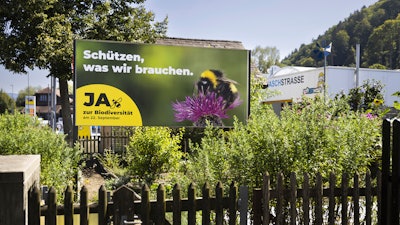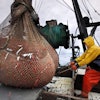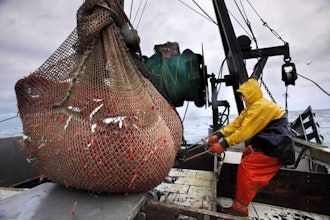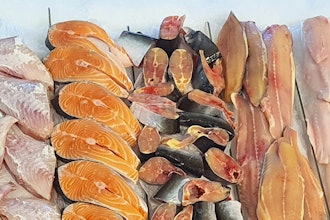
GENEVA (AP) — Switzerland, known for natural beauty like pristine lakes and majestic Alpine peaks, ranks among the world's richest countries whose plant and animal life is under the greatest threat. Environmentalists were seeking better protections for the country's biodiversity in a nationwide vote that culminated Sunday.
Final official results showed more than 63% of voters casting ballots had rejected the initiative that aimed to boost public funding to encourage farmers and others to set aside lands and waterways to let the wild develop more, and increase the total area allocated for green spaces that must remain untouched by human development.
The contest was decided by mail-in ballots followed by a morning of in-person voting Sunday.
Factors behind the weakening biodiversity in the country of rivers, lakes, valleys and mountains include intensified agriculture, soil alteration, a fragmentation of the landscape — such as the building of roads and housing that cut through wildlife habitats — and pollution and climate change, proponents of the measure said.
The federal government — parliament and the executive branch — opposed the plan, as did many rural voters and the country's main right-wing party, according to polls. They called it too costly, saying 600 million Swiss francs (over $700 million) is already spent on biodiversity protection each year, and fear economic development will suffer.
Passage was estimated to cost at least another 400 million francs for national and local governments, the Federal Council estimates. The initiative would also, for example, prohibit the construction of new railway lines through protected dry meadows — even if such meadow is set aside and developed elsewhere, it says.
“Passage of the biodiversity initiative would severely limit (sustainable) energy and food production, restrict the use of forests and rural areas for tourism, and make construction more expensive,” argued the campaign for a “no” vote on its website. “YES to biodiversity, but NO to the extreme biodiversity initiative.”
Proponents, meanwhile, pointed to dwindling natural resources in Switzerland and threats to bees, frogs, birds, mosses and other wildlife. They argued that protected green spaces are “the main capital for tourism” and more of them would support local economies.
“Diversified nature guarantees air purity, drinkable water, pollination, fertility of the soil, and our food supply,” said a committee that backed the idea. “But in Switzerland, biodiversity is suffering. One-third of all our plant and animal species are threatened or have already disappeared.”
The Organization for Economic Cooperation and Development, a think tank that counts 38 mostly rich countries as members, has produced a comparative look at threats to plant and animal life. Switzerland ranks among the top four countries with the highest rates of threatened species in all eight categories of wildlife.
The voting was part of the latest Swiss referendums, which take place four times a year to give voters a direct say in policymaking in the country of around 9 million people. The only other nationwide issue up for consideration this time was a pension reform plan backed by the government.
More than two-thirds of voters turned down the pension reform plan, the final results showed.






















